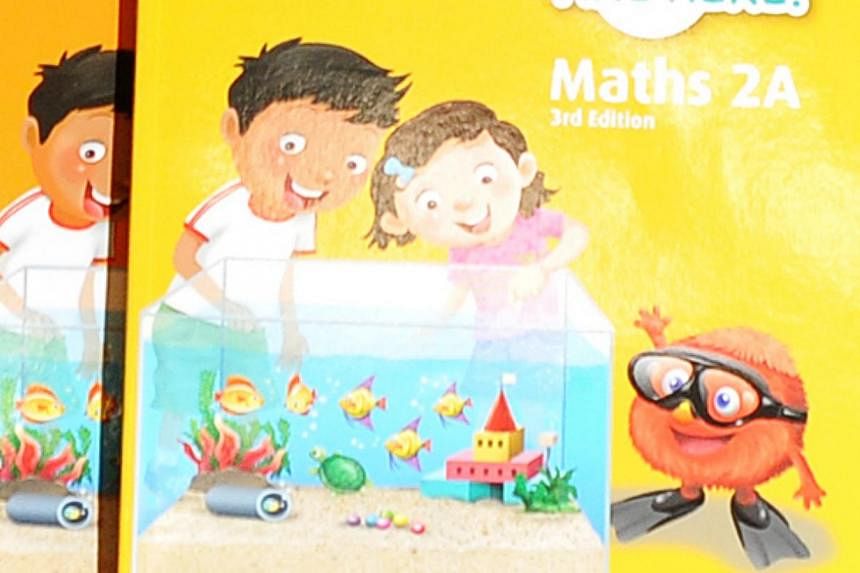If you are 21 or younger - or if you had taught children how to add - you might remember a brightly-coloured primary school maths textbook with furry-looking characters holding up calculators and building blocks.
Published by Marshall Cavendish Education, the My Pals Are Here! series was first taken up in schools here in 2001 and is now into its third edition.
More than 80 per cent of primary schools here use it and thousands of children have pored over the books. The books have proven so popular that they have been adapted for use in 10 countries, from Brunei to Chile.
The man behind these books is Dr Fong Ho Kheong, 66, a former maths teacher who later taught teachers to teach maths.
It was about 14 years ago in 1999 that he was approached by a publisher to write the textbooks.
"Just write!" said the series' lead author, recalling a piece of advice he gave himself then.
At that time, he was a maths lecturer at the National Institute of Education (NIE), and writing maths assessment books, but it was still a challenge to him.
"It's totally different to write assessment books and textbooks," he said. "Assessment books are more about drilling and practising, so you just need to come up with questions. Actually, any teacher can do that.
"But a textbook is different - it emphasises learning, the topics and brings in pedagogy, strategies and concepts."
Born in the state of Perak in Malaysia to a businessman and housewife, Dr Fong is the third of eight children. He graduated with a maths degree from the University of Malaya, before coming to NIE in Singapore to obtain a diploma in education.
He taught maths in a secondary school in Malaysia for five years and was later asked by his former professor to join the NIE.
He did that from 1978, training many batches of Singapore's teachers before he left the country in 2003 to join his family who had moved to Sydney earlier.
He took up Singapore citizenship in 1988, and completed a PhD in mathematics education from King's College London, University of London, in 1992.
These days, home for Dr Fong and his wife, a former teacher, is a landed house in Sans Souci, a southern Sydney suburb.
But he is still kept busy by his love for maths.
Last year, he opened an enrichment centre in Sydney using a "BrainBuilder" programme, which is based on Singapore maths methods, such as model drawings.
The centre now has more than 100 students.
In July, he opened another centre in Kuala Lumpur, which now has about 60 students.
He hopes to set up a third centre in Singapore next year, and is looking for a venue.
He has also licensed his programme to 26 other centres in Malaysia, where some 2,000 students are enrolled.
As a consultant, he flies to countries such as the United States several times a year to run workshops and talks to explain to educators how Singapore maths works. "Numeracy is an important skill. Children must have the basic foundation of numeracy so that they can go on to use their skills in society as engineers, accountants or academics," he said.
He has two children of his own in their 30s, and three grandchildren. His daughter, a former accountant and the elder of his two children, helps out at his Sydney centre, while his son is a venture capitalist in San Francisco.
"It's about imparting two types of skills to the young: basic numeracy skills and critical thinking skills to those who have the ability to go further," he said.
And Singapore maths, which uses a concrete-pictorial-abstract approach, could very well be the key to doing that, he said.
The method uses visual means, such as diagrams and objects, to represent concepts, and this works, he said. "Children don't see the logic if you just give them a lot of words. They understand it better through pictures."
Will he retire any time soon?
"Unlikely," he said. "Maths is my greatest passion and I like it because I can understand it so well.
"I spend a lot of time at the centre teaching so that I can keep in touch with students and keep improving on my materials."
But over the years, he has found time for hobbies, namely, going for Cantopop concerts and watching tennis matches live.
His favourite Hong Kong singers are Frances Yip and Joseph Koo, and he enjoys watching Spanish tennis player Rafael Nadal.
"I don't feel tired, but it's definitely important to get rest in between," he said.



